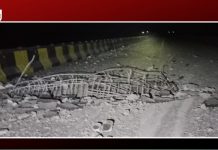An umbrella group affiliated with the Kurdistan Workers’ Party (PKK) has claimed responsibility for an attack in Istanbul, dedicating the operation to two Baloch “Fidayeen” (self-sacrificers), Mahal Baloch, alias Zilan Kurd, and Rizwan Baloch, alias Hammal.
The People’s United Revolutionary Movement (HBDH), an alliance of Kurdish and Turkish left-wing groups, said its fighters carried out the attack on service vehicles at Şişli Plaza in Istanbul on 3 September. The group claimed that the operation caused significant damage.
According to Turkish media, armed individuals entered the premises, set part of the building on fire, destroyed vehicles, and fled the scene.
In its statement, HBDH said, “Our Tekîn Goyî militia units successfully completed the sabotage operation and returned to their positions.” The group dedicated the attack to the Baloch Liberation Army (BLA), specifically honouring two BLA “Fidayeen,” Mahal Baloch and Rizwan Baloch, who were killed during the recent “Operation Herof” in Balochistan.
“We dedicate this operation to the martyrs of the Baloch Liberation Army, Zilan Kurd (Mahal Baloch) and Rizwan Baloch (Hammal), who sacrificed their lives for freedom,” the statement added.
Mahal Baloch, also known as Zilan Kurd, and Rizwan Baloch reportedly detonated Vehicle-Borne Improvised Explosive Devices (VBIEDs) at the gates of a Pakistani military camp in Bela, initiating the BLA’s “Operation Herof.”
According to the BLA, Mahal Baloch, aged 22 and a former law student at Turbat Law College, played a central role in the Bela attack by reportedly driving an explosives-laden vehicle into the camp’s main gate, allowing other fighters to enter. The BLA described her as a symbol of political awareness and a prominent figure in the Baloch national liberation movement.
Rizwan Baloch, also 22, from Panwan, Gwadar, participated in the same operation by driving a second explosives-laden vehicle into the Bela camp, reportedly causing significant damage to Pakistani forces.
Baloch-Kurd Solidarity
The dedication of the Istanbul attack to Baloch “Fidayeen” highlights the growing solidarity between Kurdish and Baloch liberation movements, both of which have historically resisted what they describe as state repression and occupation.
In recent years, these movements have expressed mutual support and drawn inspiration from each other’s struggles. The BLA’s “Operation Herof” in Balochistan, which targeted key locations across the region, and the naming of Mahal Baloch after “Zilan Kurd”—a Kurdish woman who carried out a suicide attack against Turkish soldiers in 1996—underscore this connection.
The HBDH’s decision to honour Mahal Baloch and Rizwan Baloch further reflects the strengthening relationship between Kurdish and Baloch movements.
HBDH, an alliance that includes Kurdish resistance groups and socialist factions from Turkey, Syria, and Iraq, remains critical of the Turkish state’s policies. The attack in Istanbul is part of HBDH’s broader campaign against what it calls “state oppression.”
The increasing solidarity between Kurdish and Baloch fighters reflects a deepening relationship, with both groups advocating for greater autonomy and freedom for their peoples. Recent developments suggest expanding collaboration between these movements as they pursue what they describe as “national liberation.”





























